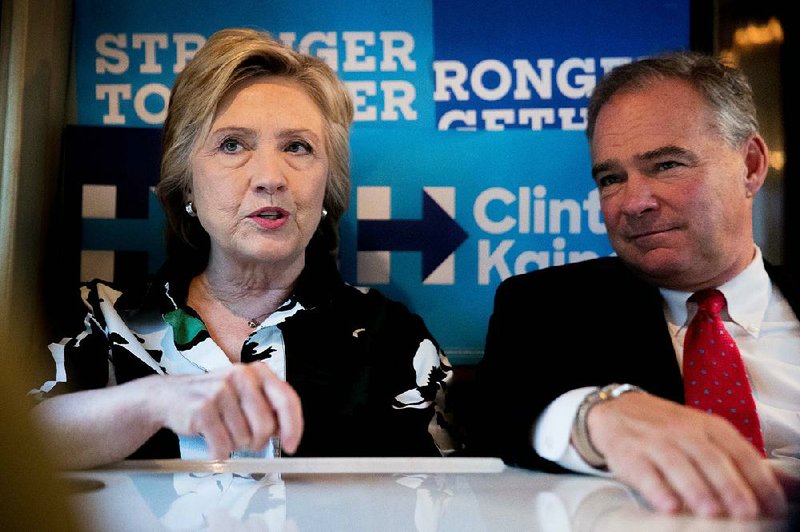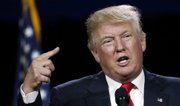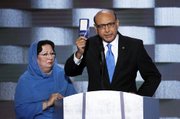Republican presidential candidate Donald Trump was criticized Sunday for attacks on the speech given at last week's Democratic National Convention by the parents of a Muslim U.S. Army captain who died in Iraq.
FULL ELECTION COVERAGE
At the convention, Khizr Khan, who was born in Pakistan, questioned whether Trump had ever read the Constitution and, addressing Trump, said, "you have sacrificed nothing."
Trump took to Twitter on Sunday morning to continue his criticism of Khan.
"I was viciously attacked by Mr. Khan at the Democratic Convention. Am I not allowed to respond? Hillary [Clinton] voted for the Iraq war, not me!" Trump tweeted, referring to the Democratic presidential nominee.
Trump on Sunday was again rebuked by Khan and by his wife, Ghazala, who lashed out at Trump for his views on immigrants and Islam. Members of his own party also tried to step away from his rhetoric.
"He is a black soul," said Khizr Khan, whose son Humayun posthumously received a Bronze Star and a Purple Heart after he was killed in Iraq in 2004. "And this is totally unfit for the leadership of this beautiful country.
"Two things are absolutely necessary in any leader or any person that aspires, wishes to be a leader. That is moral compass and, second, is empathy," Khan said on CNN's State of the Union. "This candidate is void of both traits that are necessary for the stewardship of this country."
He added, "It is majority leader's and speaker's moral, ethical obligation to not worry about the votes, but repudiate him, withdraw the support."
On NBC's Meet the Press, Khan said the U.S. political process is "wonderful" and "beautiful" and urged patriotic people not to vote for Trump.
"I implore those patriotic Americans that would probably vote for Donald Trump in November, I appeal to them, not to vote for hatred, not to vote for fearmongering," Khan said. "Vote for unity. Vote for the goodness of this country. Vote for liberty and freedom. So my appeal now is to the folks that are going to be thinking to vote for Trump."
Clinton on Sunday accused Trump of repaying the "ultimate sacrifice" of a U.S. Army captain with insults and degrading comments about Muslims. Speaking about Republicans, she said: "This is a time to pick country over party."
Speaking late Saturday in Youngstown, Ohio, former President Bill Clinton likened Trump's treatment of the Khans to his ridicule of Sen. John McCain, R-Ariz., who was a prisoner of war in Vietnam.
"I was crazed by the attack on Sen. McCain. But at least he survived," Clinton said. Of Humayun Khan, Clinton said, "That man gave his life for his unit."
In statements released Sunday, Senate Majority Leader Mitch McConnell and House Speaker Paul Ryan condemned any criticism of Muslim Americans who serve their country and rejected the idea of a Muslim travel ban -- an idea proposed by Trump earlier in the campaign. But neither statement mentioned Trump by name or repudiated him.
McConnell praised Humayun Khan as an "American hero," while Ryan noted that many Muslim Americans have served "valiantly" in the U.S. military.
"Captain Khan was one such brave example. His sacrifice -- and that of Khizr and Ghazala Khan -- should always be honored. Period," Ryan said.
Democrat Harry Reid, the Senate minority leader, issued a blistering statement of his own, saying that anything short of revoking endorsements of Trump was "cowardice" on the part of McConnell and Ryan.
"This shouldn't be hard," Reid said. "Donald Trump is a sexist and racist man who insults Gold Star parents, stokes fear of Muslims and sows hatred of Latinos. He should not be president, and Republican leaders have a moral responsibility to say so."
Trump also lashed out at Khizr Khan's wife. During the convention speech, Ghazala Khan stood quietly by her husband's side.
"If you look at his wife, she was standing there. She had nothing to say. She probably, maybe she wasn't allowed to have anything to say," Trump said in an interview with ABC's This Week, from which a partial transcript was released Saturday.
Ghazala Khan responded Sunday in an opinion piece published in The Washington Post, saying that talking about her son's death 12 years ago is still hard for her. When her husband asked whether she wanted to speak at the convention, she said she could not.
"Donald Trump has asked why I did not speak at the Democratic convention. He said he would like to hear from me. Here is my answer to Donald Trump: Because without saying a thing, all the world, all America, felt my pain. I am a Gold Star mother. Whoever saw me felt me in their heart," she wrote.
"When Donald Trump is talking about Islam, he is ignorant," she added.
At one point, Trump had disputed Khan's criticism that the businessman hasn't sacrificed for his country.
"I've made a lot of sacrifices," Trump said. "I work very, very hard. I've created thousands and thousands of jobs, tens of thousands of jobs, built great structures."
Trump, who had no campaign events scheduled over the weekend, released a statement late Saturday calling Humayun Khan "a hero" but disputing his father's convention remarks.
"While I feel deeply for the loss of his son, Mr. Khan, who has never met me, has no right to stand in front of millions of people and claim I have never read the Constitution, (which is false) and say many other inaccurate things," Trump said.
Trump's rebuke was unusual in the world of politics, where officials typically speak well of families whose loved ones die in service to their country. When Cindy Sheehan, who lost her son in Iraq, staged prolonged protests on the war, then-President George W. Bush responded by saying that the nation grieves every death.
When asked about the mother of a State Department official killed in Benghazi, Libya, who blamed Hillary Clinton for her son's death, Clinton told Fox News Sunday that her "heart goes out" to the families and that she didn't "hold any ill feeling for someone" who has lost a child and recalls events differently.
Sen. Lindsey Graham, R-S.C., said Sunday that Trump had crossed another inviolable line and that Trump's jabs at Khizr and Ghazala Khan were entirely unacceptable. "This is going to a place where we've never gone before, to push back against the families of the fallen," he said.
He added: "The problem is, 'unacceptable' doesn't even begin to describe it."
Rep. Mike Coffman of Colorado, a Republican who served in combat as a Marine, denounced Trump's remarks. Coffman, who represents a swing district in the Denver suburbs, said Trump had disrespected U.S. troops.
"Having served in Iraq, I'm deeply offended when Donald Trump fails to honor the sacrifices of all of our brave soldiers who were lost in that war," Coffman said.
Across the country, veterans and their families closely watched the political back-and-forth.
"It was inappropriate on both sides," said Mark Farner of Ocean Isle Beach, N.C., as he stood a few feet from the Vietnam Veterans Memorial in Washington. "For one, to use it as the Democrats intended it to be used, and I don't think Trump handled it the way he should have on his end."
Romell Short of Washington, a U.S. Marine Corps veteran who deployed to Iraq and Afghanistan, said he has no problem with veterans' families being politically active and speaking about their experiences.
"America should know the suffering and the cost of war, and part of that is the sacrifice of American troops and the sacrifice of American families," Short said.
But he cautioned that the views of families should be read separately from their relatives who served.
Russia concerns
Speaking about world issues in interviews that aired Sunday, Clinton said Trump's rhetoric toward Russia and its president, Vladimir Putin, raises concerns about national security. Trump, meanwhile, again left open the possibility of recognizing the Crimean Peninsula, which Russia annexed from Ukraine after a referendum in 2014, as Russian territory and lifting related sanctions.
Clinton pointed to Trump's comments in recent days in which he seemed to encourage the Russian government to hack into her deleted private emails, as well as the remarks about Crimea and sanctions. Trump later said that his comments calling on Russia to unearth the Clinton emails were just sarcasm.
Trump has "shown a very troubling willingness to back up Putin," Clinton said in an interview on Fox News Sunday.
"I think laying out the facts raises issues about Russian interference in our elections, in our democracy," Clinton said. "We would not tolerate that from any other country, particularly one with whom we have adversarial positions. And for Trump to both encourage that and to praise Putin despite what appears to be a deliberate effort to try to affect the election, I think, raises national security issues."
Trump said on ABC's This Week that he had "no relationship" with Russia, contradicting past statements.
"You did say on three different occasions you had a relationship with him. Now you say there is not," host George Stephanopoulos said, referring to Putin.
Trump answered: "Well, I don't know what it means by having a relationship. I mean he was saying very good things about me, but I don't have a relationship with him."
Trump said he is looking at recognizing Crimea as Russian territory.
"I'm going to take a look at it. But, you know, the people of Crimea, from what I've heard, would rather be with Russia than where they were. And you have to look at that, also," Trump said. "Just so you understand, that was done under [President Barack] Obama's administration."
Trump said that if he were president, Putin would not send his forces into Ukraine. But Trump backpedaled when Stephanopoulos pointed out that Russian troops had been there for nearly two years.
"He's not going into Ukraine, OK; just so you understand," Trump said. "He's not going to go into Ukraine, all right? You can mark it down. You can put it down. You can take it anywhere you want."
"Well, he's already there, isn't he?" Stephanopoulos said.
"OK, well, he's there in a certain way," Trump replied. "But I'm not there. You have Obama there. And frankly, that whole part of the world is a mess under Obama, with all the strength that you're talking about and all of the power of NATO and all of this."
Paul Manafort, Trump's campaign manager, said on CBS' Face the Nation that Trump "has made it very clear he views Russia to be somebody that we need to be firm with."
"Mr. Trump has said on the campaign trail the biggest threat is failed leadership on the part of Obama and Clinton," he said. "He views Russia as a foreign power head that has its own interests at stake, and we, the United States, have to put America's interest first."
Accepting the annexation would be a departure from U.S. policy. The U.S. and European Union worked together to punish Russia by imposing economic sanctions and have shown no willingness to lift them.
Russian state television coverage of Clinton accepting the Democratic nomination portrayed her as a Russian enemy who cannot be trusted, and the Democratic Party convention was portrayed as further proof that American democracy is a sham.
In her acceptance speech, Clinton reaffirmed a commitment to NATO, saying she was "proud to stand by our allies in NATO against any threat they face, including from Russia."
In doing so, she was implicitly rebuking Trump, who has questioned the need for the Western alliance and suggested that if he is elected president, the United States might not honor its NATO military commitments, in particular regarding former Soviet republics in the Baltics.
Immigration stances
On immigration, Clinton told Fox News Sunday that her priority if elected would be to deport violent criminals and those linked to terrorism.
"But don't go rounding up hard-working mothers and fathers, taking them out of the factories or the hotels or the homes where they're working, making them disappear and leaving their children alone," she said. "That doesn't make any sense to me."
Republican officials appear eager to push Trump in a more moderate direction on immigration, telling Hispanics that he has abandoned his divisive primary pledge to deport the estimated 11 million people living in the country illegally -- even if Trump hasn't said so publicly himself.
"Trump has already said that he will not do massive deportations," Helen Aguirre Ferre, the Republican National Committee's director of Hispanic communications, told reporters at a Spanish-language briefing at the party's convention two weeks ago. Instead, she said, "he will focus on removing the violent undocumented who have criminal records and live in the country."
A similar interpretation has also developed among Hispanic and religious leaders who have met with Trump privately in recent months. Trump, they say, has been signaling that he is open to embracing a less punitive immigration policy that focuses on "compassion" along with the rule of law. Seizing on what they see as an opportunity to steer the candidate, several have formed an informal advisory committee that has been working on a series of recommendation they hope to Trump will consider.
"He realizes that there are a lot of good people that are in the shadows. He wants some proposals on how to work on that," said Ohio-based televangelist Frank Amedia, who is helping to lead the effort.
Information for this article was contributed by Lisa Lerer, Jonathan Lemire, Chad Day of The Associated Press; by Katie Zezima, Michelle Ye Hee Lee of The Washington Post; by Alexander Burns, Maggie Haberman, Ashley Parker and David E. Sanger of The New York Times; and by Ben Brody and Anna Edney of Bloomberg News.
A Section on 08/01/2016


